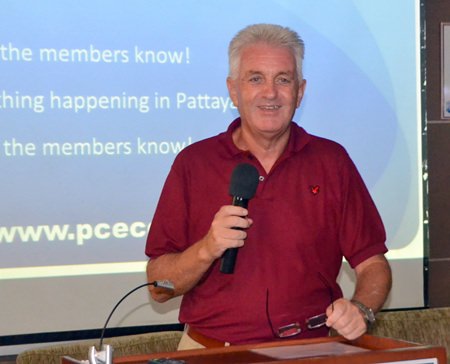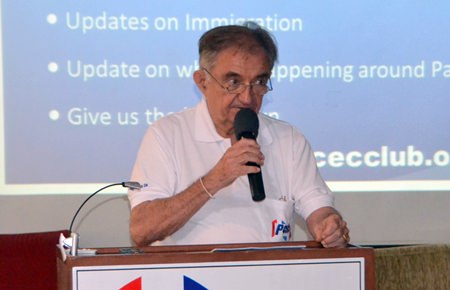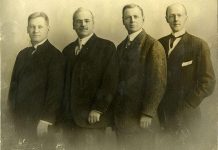Ordinary people commit genocide and mass killings. This is the theme of the book “Becoming Evil: How Ordinary People Commit Genocide and Mass Killing” by James Waller on which Steven Lance Stoll, a sociologist, based his talk to the Pattaya City Expats Club meeting on Sunday, September 6. He is a former Adjunct Professor of Social Sciences teaching Sociology at several colleges in the Jacksonville, Florida area until May 2014. He presently is teaching English in Chonburi, Thailand, and has previously spoken to the PCEC on sociological issues.
Ethnocentrism is probably the most important factor explaining why people mistreat others, Lance said – “My God is better than your God,” or “My skin colour is better than yours.” With ethnocentrism comes hate – a component of bigotry – and hate crimes, which are caused by an individual’s negative belief and feelings about the members or some other group or people because of their race, religious identity, ethnic origin, gender, sexual orientation, age, or disability status.
 Steven Lance Stoll explains to his PCEC audience how ordinary people can be the perpetrators of genocide and mass killings and the reasons behind such social evil.
Steven Lance Stoll explains to his PCEC audience how ordinary people can be the perpetrators of genocide and mass killings and the reasons behind such social evil.
Lance said that he was shocked by the amount of prejudice there is everywhere, even in Thailand. He mentioned that it’s possible to eliminate discrimination, but eliminating stigma is not so easy. Further, people who commit evil tend to dehumanize their victims; it helps the perpetrator to believe that his crime is justified. Along with dehumanization comes infantilization, he added. For example when blacks were enslaved they were treated as children; once slavery was abolished they were dehumanized and treated as sub-human.
Historically, Jews are the group most hated, Lance pointed out. Hate crimes are under-reported, he added, but today in the U.S. when they are reported, the top three groups targeted by hate crimes ate (1) blacks, (2) Jews, and (3) gays and lesbians. Transgendered people are the most likely to be murdered.
 MC Roy Albiston presents Steven Lance Stoll with the PCEC Certificate of Appreciation for another of his interesting and enlightening talks on social issues.
MC Roy Albiston presents Steven Lance Stoll with the PCEC Certificate of Appreciation for another of his interesting and enlightening talks on social issues.
Lance drew an analogy between the fear of snakes and xenophobia. “Two thousand years ago,” he said, “if you were bit by a snake you died, so mass fear of snakes was justified.” Today, there is probably no reason to be afraid of snakes. In the early days of man’s existence on Earth, if you weren’t afraid of other people, you got killed. Xenophobia was a survival mechanism for thousands of years. Today, Lance noted, in the over-populated plate we live in, xenophobia is no longer useful.
Lance referred to “benign prejudice” which involves blaming one’s inequality on a group. In Hitler’s time, he said, Jews were 3% of the population in Germany, but they were blamed for everything. Further, the mass killings committed by the Nazis were not the first genocide. The Bible is full of stories of genocide. The first genocide in the 20th century was committed against Armenians. Lance said that the largest genocide in history was the one committed against Native Americans. He explained that the genocide in Cambodia was unique, because it was the intellectuals who were targeted.
 PCEC member David Meador interviews Steven Lance Stoll after his presentation. To view the video, visit https://www. youtube.com/watch?v=B-wdkdR6t28.
PCEC member David Meador interviews Steven Lance Stoll after his presentation. To view the video, visit https://www. youtube.com/watch?v=B-wdkdR6t28.
According to Lance, to deny the holocaust is ridiculous because the Nazis were proud of what they did. They kept meticulous records. The killings were carried out by thousands of people, not just a few people at the top. Most Nazis were not idealists or killers of conviction; they were killers by circumstance and opportunity. Ordinary German soldiers carried out much of the murdering. Lance said, “That’s why I say that it is ordinary people who commit most evil.”
The Soviet dissident, Alexander Solzhenitsyn, said, “If only there were evil people somewhere, insidiously committing evil deeds, and it were necessary only to separate them from the rest of us and destroy them. But the line dividing good and evil cuts through the heart of every human being. And who is willing to destroy a piece of his own heart?”
Lance quoting James Waller, said that since World War II we have had 150 wars in 60 nations and only 26 days of world peace. Over 100 million people died violently in wars and conflicts in the 20th century, five times the number in the 19th century and 10 times the number in the 18thcentury. That does not include internal wars or police actions, Lance said. “British police have killed 59 people in the last 115 years. American police have killed 369 people in the last 115 days.”
 MC Roy Albiston welcomes back Steven Lance Stoll to the PCEC for another enlightening presentation on a social topic. Lance, a sociologist, has previously spoken to the Club on several interesting social issues.
MC Roy Albiston welcomes back Steven Lance Stoll to the PCEC for another enlightening presentation on a social topic. Lance, a sociologist, has previously spoken to the Club on several interesting social issues.
If we don’t do anything about one genocide, Lance asserted, others will follow. At least German children today learn all about what happened during the holocaust. But, unfortunately, Japanese children are not taught about the atrocities their country committed.
There were heroes who tried to deliver us from extraordinary evil, Lance said. He cited the example of Sir Nicholas Winton who saved the lives of 669 Jewish Czech children. But they did not consider themselves heroes, Lance added. They saw themselves as decent people doing what all decent people should do. Winton told no one about what he had done, not even his wife.
 PCEC Member Pat Koester announces she is organizing a day tour entitled “Thai Temple Fair Evening.” Temple fairs are common over much of Thailand and she invited others to join her to learn more about Thai culture by going to the fair to see what it’s all about.
PCEC Member Pat Koester announces she is organizing a day tour entitled “Thai Temple Fair Evening.” Temple fairs are common over much of Thailand and she invited others to join her to learn more about Thai culture by going to the fair to see what it’s all about.
After the presentation, MC Roy Albiston brought everyone up to date on upcoming events and called on Anne Smith to conduct the Open Forum, where questions are asked and answered about Expat living in Thailand, especially Pattaya.
For more information on the PCEC’s many activities, visit their website at www.pcecclub.org.




